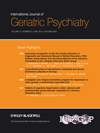Efficacy of memantine in delaying clinical worsening in Alzheimer's disease (AD): responder analyses of nine clinical trials with patients with moderate to severe AD
Abstract
Objective
Responder analyses are of relevance to evaluate the benefits of a medical treatment. The aim of the current paper is to analyse the response of patients with moderate to severe Alzheimer's disease (AD) to memantine, and clinical relevant response is defined as a delay of clinical worsening.
Methods
Post hoc analyses were performed over the results of nine individual clinical trials including 2506 study patients. Overall, estimates of the odds ratio (OR) and corresponding confidence intervals were based upon a random-effect model for three individual domains (cognition, activities of daily living and clinical global impression). In addition, a combined responder criterion (triple response) includes all three individual domains.
Results
Responder analyses have shown that AD patients treated with memantine benefited from a significant delay of clinical worsening compared with placebo-treated patients, and fewer patients faced clinical worsening in the relevant domains cognition (24.6% vs 36.2%, p < 0.001), activities of daily living (56.2% vs 61.6%, p < 0.05) and global impression of change (40.9% vs 49.8, p < 0.001). In addition, response to treatment on the combined domains (triple response) was significantly in favour of memantine compared with placebo, with fewer patients showing clinical worsening (11.0% vs 20.4%, p < 0.001).
Conclusions
Treatment with memantine delays clinical worsening in patients with moderate to severe AD when compared with placebo. This effect was seen in single domains (cognition, functional abilities and clinical global impression) as well as in the combination of these domains. The consistent results prove the beneficial effects of memantine in moderate to severe AD patients. Copyright © 2011 John Wiley & Sons, Ltd.




